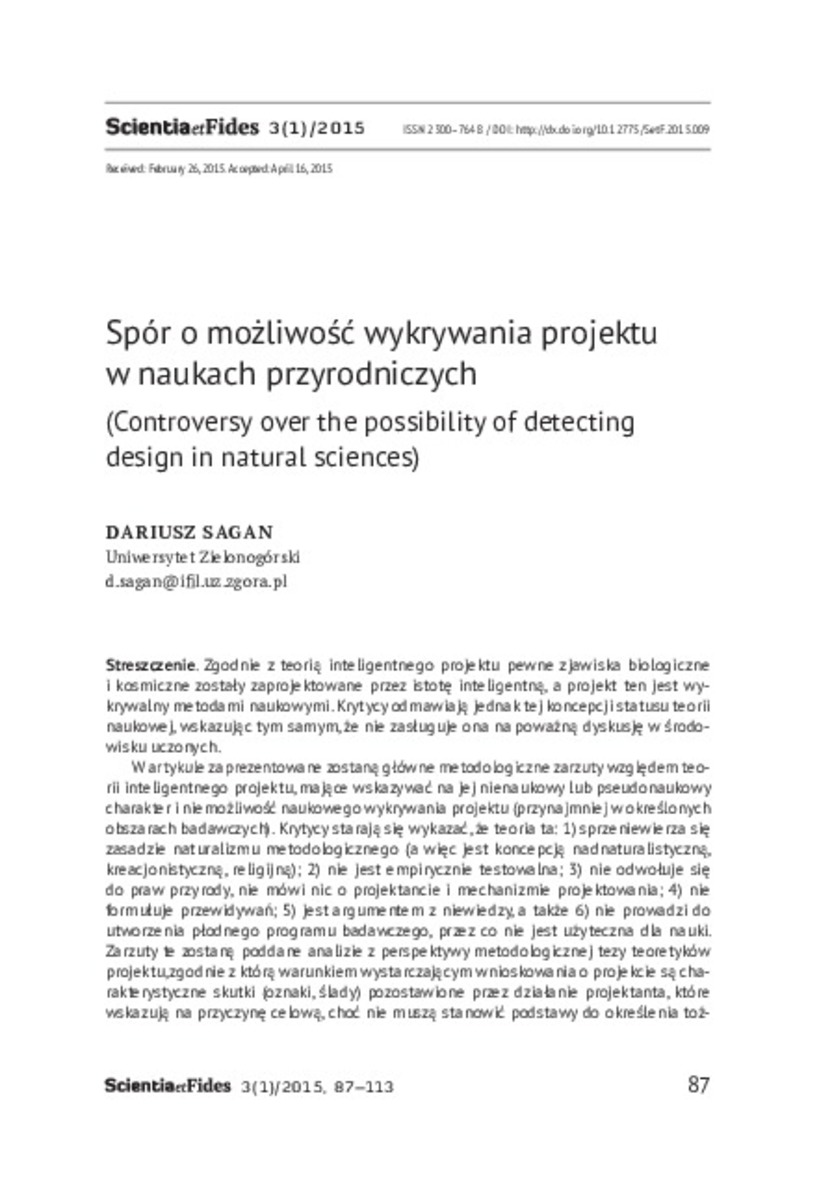Full metadata record
| DC Field | Value | Language |
|---|---|---|
| dc.creator | Sagan, D. (Dariusz) | - |
| dc.date.accessioned | 2015-07-03T08:29:30Z | - |
| dc.date.available | 2015-07-03T08:29:30Z | - |
| dc.date.issued | 2015 | - |
| dc.identifier.citation | Sagan, Dariusz. “Spór o możliwość wykrywania projektu w naukach przyrodniczych”, Scientia et Fides, Vol. 3, n. 1, 2015, pp.87-114. | es_ES |
| dc.identifier.issn | 2300-7648 | - |
| dc.identifier.uri | https://hdl.handle.net/10171/38700 | - |
| dc.description.abstract | According to intelligent design theory, certain biological and cosmic phenomena are designed by an intelligent being and this design is scientifically detectable. However, critics refuse to regard this theory as scientific, thereby suggesting that it does not deserve serious discussion in scientific circles. The article presents main methodological objections to intelligent design theory, indicating its unscientific or pseudoscientific character and impossibility of scientific design detection (at least in specific research areas). Critics try to show that this theory: 1) violates the principle of methodological naturalism (and thus that it is a supernatural, creationist, religious concept); 2) is empirically untestable; 3) it does not invoke natural laws, says nothing about the designer and the designing mechanism; 4) it does not offer predictions; 5) it is an argument from ignorance, and 6) it does not lead to fruitful research program and hence is not useful for science. These objections will be analyzed from the perspective of methodological thesis of design theorists that the sufficient condition of design inference are the characteristic effects (signs, traces) leaved by the activity of the designer, which indicate the final cause, although they do not have to be the basis for determining the designer’s identity. If this thesis is sound, then the objections that intelligent design theory is not scientific are rebutted or weakened. Moreover, it turns out that, basically, detecting design of supernatural beings does not differ from detecting design of natural beings. For that reason, there is no qualitative difference between these two procedures and both can be regarded as scientific. | es_ES |
| dc.description.abstract | Zgodnie z teorią inteligentnego projektu pewne zjawiska biologiczne i kosmiczne zostały zaprojektowane przez istotę inteligentną, a projekt ten jest wykrywalny metodami naukowymi. Krytycy odmawiają jednak tej koncepcji statusu teorii naukowej, wskazując tym samym, że nie zasługuje ona na poważną dyskusję w środowisku uczonych. W artykule zaprezentowane zostaną główne metodologiczne zarzuty względem teorii inteligentnego projektu, mające wskazywać na jej nienaukowy lub pseudonaukowy charakter i niemożliwość naukowego wykrywania projektu (przynajmniej w określonych obszarach badawczych). Krytycy starają się wykazać, że teoria ta: 1) sprzeniewierza się zasadzie naturalizmu metodologicznego (a więc jest koncepcją nadnaturalistyczną, kreacjonistyczną, religijną); 2) nie jest empirycznie testowalna; 3) nie odwołuje się do praw przyrody, nie mówi nic o projektancie i mechanizmie projektowania; 4) nie formułuje przewidywań; 5) jest argumentem z niewiedzy, a także 6) nie prowadzi do utworzenia płodnego programu badawczego, przez co nie jest użyteczna dla nauki. Zarzuty te zostaną poddane analizie z perspektywy metodologicznej tezy teoretyków projektu, zgodnie z którą warunkiem wystarczającym wnioskowania o projekcie są charakterystyczne skutki (oznaki, ślady) pozostawione przez działanie projektanta, które wskazują na przyczynę celową, choć nie muszą stanowić podstawy do określenia toż- Spór o możliwość wykrywania projektu w naukach przyrodniczych samości projektanta. Uznanie słuszności tej tezy prowadzi do odparcia lub osłabienia zarzutów o nienaukowość teorii inteligentnego projektu. Okazuje się też, że wykrywanie projektu istot nadnaturalnych nie różni się zasadniczo od wykrywania projektu istot naturalnych. Nie ma więc jakościo. | es_ES |
| dc.language.iso | pol | es_ES |
| dc.publisher | Universidad Nicolás Copérnico de Torun | es_ES |
| dc.rights | info:eu-repo/semantics/openAccess | es_ES |
| dc.subject | Demarcation criterion | es_ES |
| dc.subject | Methodological naturalism | es_ES |
| dc.subject | Testability | es_ES |
| dc.subject | Mechanism | es_ES |
| dc.subject | Prediction | es_ES |
| dc.subject | Argument from ignorance | es_ES |
| dc.subject | Fruitful research program | es_ES |
| dc.subject | Argument from design detection method | es_ES |
| dc.subject | Kryterium demarkacji | es_ES |
| dc.subject | Naturalizm metodologiczny | es_ES |
| dc.subject | Testowalność | es_ES |
| dc.subject | Mechanizm | es_ES |
| dc.subject | Przewidywanie | es_ES |
| dc.subject | Argument z niewiedzy | es_ES |
| dc.subject | Płodny program badawczy | es_ES |
| dc.subject | Argument z metody wykrywania projektu | es_ES |
| dc.title | Spór o możliwość wykrywania projektu w naukach przyrodniczych | es_ES |
| dc.type | info:eu-repo/semantics/article | es_ES |
Files in This Item:
Statistics and impact
Items in Dadun are protected by copyright, with all rights reserved, unless otherwise indicated.






